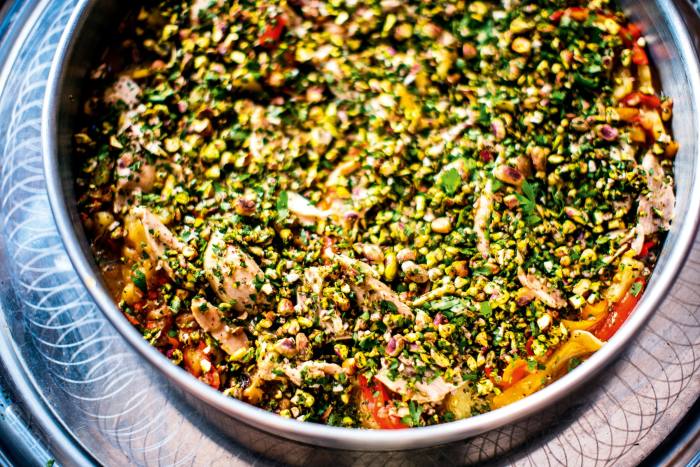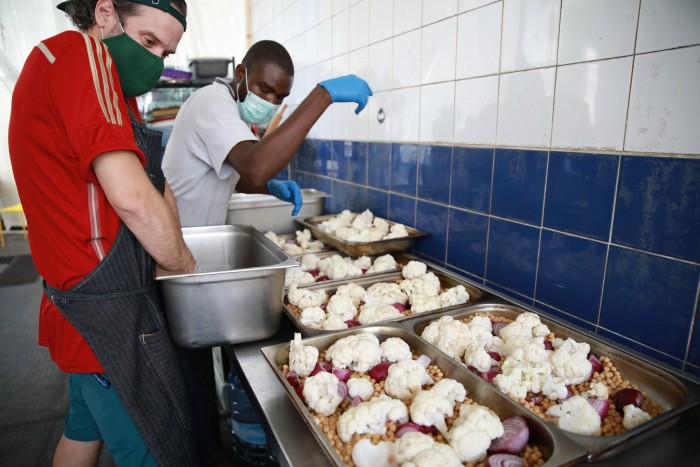[ad_1]
The story of the Great Oven began on a trip to Lebanon with Nigel Slater. It was 2017 and the British food broadcaster was filming his three-part series Nigel Slater’s Middle East. Also on the trip was his long-time collaborator and co-founder of his TV production company, James Gomez Thompson. A Cordon Bleu-trained chef, Thompson had always been obsessed with communal ovens. His Spanish grandmother had regaled him with tales of the shared hearth in her hometown in La Mancha. In Lebanon, he heard a phrase for gossipy women that translated as “women of the oven†and understood that communal ovens had long been part of the culture there, too.
Thompson also learned from the show’s Lebanese producer, Nour Matraji, of a recurring Sunni and Alawite conflict that had ravaged parts of the northern Lebanese city of Tripoli for many years. Putting these thoughts together, he came up with the idea of building a community oven on the frontline where young men from either side of the conflict could cook and eat together with other locals.


Within a year, Matraji and Thompson had launched the project. They had an Armenian oven-builder living outside Beirut construct a two-tonne oven and Thompson persuaded LA-based street artist Shrine, famous for having built a temple at Burning Man, to decorate it. Several former child fighters from the neighbourhood got involved. Shrine turned what was once a sniper perch into a makeshift studio and created an oven mosaic out of found objects. He showed the men that art could be made out of anything. When they weren’t painting murals, Thompson taught them how to cook. “Lamb belly was incredibly cheap and they didn’t use it often,†says Thompson. “I showed them how to score the belly, fill it with za’atar and slow-roast it. In Tripoli they have this crumpet-like pancake called atayef, which they love with cream. I thought it’d be interesting to have it with our roasted lamb belly, so we made atayef tacos filled with lamb and soaked in the meaty juices.â€

Over the following months, the oven went wherever it was needed. In 2019 it was moved to The Ballroom Blitz nightclub in Beirut, where it helped feed refugees in the Beqaa Valley. “We had cookalongs with DJs playing and up to 100 people a day cooking for 30 minutes each, meeting people from other backgrounds,†says Thompson. “All kinds of people – gay refugees, trafficked women, stateless Palestinians – gathered round the oven and found a safe space.â€
Thompson showed them how to cook in massive quantities. “We made fasolia [bean stew] and muhammara manoushe [red pepper dip]. We filled the oven with a hundred aubergines, roasted garlic and sesame seeds and made babaganoush.â€
Later the oven shifted to the Beqaa refugee camp, where Rawda Mazloum (a Syrian refugee mother of five) took charge, cooking kabseh (a rice and chicken dish), pumpkin kibbeh (croquettes), mloukhiyeh (green leaf stew) and ma’amoul (date-filled cookies) for Eid.

Then in August 2020, an explosion in Beirut’s port devastated the city. Thompson flew back immediately. The oven was hurried back to The Ballroom Blitz, wrecked but still standing. Thompson set about raising funds for more urgently needed ovens. Now there are six. Lockdown disrupted the rollout but one is intended for the Shatila refugee camp in southern Beirut and another for an orphanage in Tripoli. A third, painted to look like a Mexican wrestling mask, has gone to a blown-up gas station in Geitawi known as “Nation Stationâ€, which became a centre for rescue efforts after the blast. At the time, food was coming from the Lebanese Food Bank and other sources including a five-star hotel that was closing down. Alongside bottles of Modena balsamic vinegar and Kikkoman soy sauce, they received hundreds of Laughing Cow-style cheese triangles, which they turned into mac-and-cheese.
What started off in Tripoli as a community building project has evolved into a hub for refugee aid and emergency food relief. Thompson believes the idea could work anywhere – from Skid Row in LA to a youth centre in London. He just got back from Colombia, where he hopes to install an oven in the Venezuelan refugee camps in Maicao. With ovens popping up round the world, he envisages a kind of Erasmus scheme where those running the ovens – refugees, ex-child fighters, trafficked women – could visit other sites and share their experiences and recipes. “I had this idea of an oven as the centre of the community in my grandmother’s hometown,†says Thompson. “To see these people recreating that in Lebanon and soon elsewhere has been astounding.â€
[ad_2]
Source link





